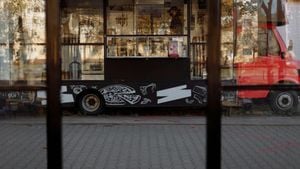The closure of Kilgraston School, Scotland's last Catholic boarding institution, has sent shockwaves across the community. Just one year after being saved from impending closure, this beloved school has succumbed to financial pressures, primarily attributed to looming tax policies and diminishing student enrollment.
Founded in 1930, Kilgraston School has long been recognized for its values and nurturing environment. With just 173 pupils currently enrolled, the school needed at least 210 students to break even and avoid the crippling deficits.
According to the school's board of trustees, the impending introduction of VAT on private school fees, touted by the Labour Party, was one of the major reasons behind their decision to shut down. They cited this alongside the staggering £860,000 funding shortfall they faced for the upcoming academic year.
"We have not taken this decision lightly," said the board, emphasizing their deep sadness over the impact on students, teachers, and families. Unfortunately, this decision came just as parents were preparing to send their children back to school.
The fees at Kilgraston were substantial, costing around £39,000 annually for boarding students and about £23,000 for day students. These costs became untenable as families grappled with rising charges and inflation, breeding concerns about future viability.
Last year, the school had miraculously avoided closure after parents rallied to raise over £2 million to support Kilgraston through its financial crisis. They believed they had turned the tide, but this optimism proved fleeting as long-term financial commitments weighed heavily.
The future seemed particularly bleak after attempts to find external investors fell through. The school was supposed to be acquired by Achieve Education, but unexpected complications resulted in their withdrawal from the deal, adding to the school’s already precarious financial situation.
With estimated debts reaching approximately £3.4 million, the board was faced with continuous mounting obstacles. The trustees expressed regret over the lack of viable solutions after exploring numerous opportunities to revive the school's fortunes.
Education, valued at both national and local levels, is deeply embedded within Scotland's culture, making the loss of such establishments poignant. Kilgraston’s closure signifies more than just the loss of students; it represents the enduring struggle many private institutions face amid changing government policies.
To aid the affected families, the board has prioritized assisting parents with finding alternative schooling for their children. They pledged to offer support and guidance during this tumultuous transition, hoping to alleviate some of the distress caused by the closure.
Meanwhile, Cedars School, another small private institution located in Greenock, has also announced its impending closure due to declining student numbers paired with the financial ramifications of VAT. This private, independent Christian school described its environment as nurturing and caring, but similar financial strains silenced its aspirations.
This situation raises broader questions about the viability of private education under the proposed VAT policy. With some schools reporting almost half of their student population having Additional Support Needs, the challenge compounds as these institutions face increased operational costs.
The educational sector is entering uncharted waters as funding models and operational frameworks undergo turmoil. For families reliant on independent schooling for their children's education, the future appears uncertain, igniting discussions surrounding the accessibility of such platforms.
Responses from local authorities indicate recognition of the strain placed on private educational institutions. An Inverclyde Council representative acknowledged the challenges faced by Cedars School, pledging continued communication with parents to assist them during this difficult time.
While traditional public schools may absorb some of the influx from private school closures, the ripple effect continues to challenge the quality and availability of education across the board. Parents, children, and educators alike are left anxiously wondering what the future may hold.
What remains to be seen is how these closures may reshape the educational landscapes of Scotland and how the government will respond to the growing crisis. The potential policy changes could either streamline resources to support struggling institutions or leave them vulnerable to forced closures.
Throughout this period of transition, the voices from the Kilgraston community resonate strongly. Their heartfelt pleas echo the essence of the school: the commitment to education and the welfare of its students, making their sudden departure all the more unsettling.
Looking forward, advocacy for policy changes could potentially reinvigorate support for institutions at risk. Whether through public campaigns or private initiatives, communities may yet find ways to safeguard educational quality.
With the closure of these schools, the impacts on educational choices for families are likely to linger, demanding attention to the viability of private education within Scotland. Such events could catalyze necessary dialogues about the future direction of educational policy.
Both Kilgraston School and Cedars School reflect the struggles faced by many private institutions during times of economic volatility and evolving educational demands. Their legacies, borne from years of tradition and community involvement, may become historical footnotes if solutions aren't found to avert similar fates for others.
Given the stakes involved, the responses from educational bodies, parents, and policymakers will play pivotal roles. Charting the future for Scottish schools certainly has considerable importance, underscoring the community's resilience to overcome these challenges.
Thus as the dust settles, one hopes lessons learned from these experiences will pave new approaches to education moving forward. Ensuring education remains accessible and enriching will require collective efforts to navigate the upcoming uncertainties.



